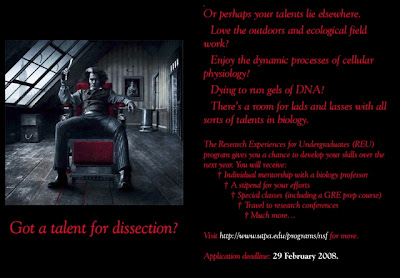
I've written before about Brian May, so it was inevitable that he would show up on a recruitment poster.
Undergraduate research in subtropical biology at The University of Texas-Pan American. Supported through a grant from the National Science Foundation. Thanks, NSF!


 Another common question this year has been, "Who should I get to write recommendation letters?"
Another common question this year has been, "Who should I get to write recommendation letters?"

 The institution: Various. The research experience is provided nationally by experienced investigators in their laboratories for 8 to 10 consecutive weeks during the summer. Students are with a research mentor at their choice of a research institution when possible.
The institution: Various. The research experience is provided nationally by experienced investigators in their laboratories for 8 to 10 consecutive weeks during the summer. Students are with a research mentor at their choice of a research institution when possible. Happy Darwin Day!
Happy Darwin Day! What is your project about?
What is your project about? The institution: Maryland Sea Grant, Chesapeake Bay, Maryland
The institution: Maryland Sea Grant, Chesapeake Bay, Maryland The institution: Louisiana State University, Baton Rouge, Louisiana
The institution: Louisiana State University, Baton Rouge, Louisiana The institutions: Many across the midwest! The institutions include University of Chicago, University of Illinois at Chicago, University of Illinois at Urbana/Champaign, Indiana University, Indiana University/Purdue University at Indianapolis, University of Iowa, University of Michigan, Michigan State University, University of Minnesota, Northwestern University, Ohio State University, Pennsylvania State University, Purdue University, University of Wisconsin-Madison, and University of Wisconsin-Milwaukee. Whew!
The institutions: Many across the midwest! The institutions include University of Chicago, University of Illinois at Chicago, University of Illinois at Urbana/Champaign, Indiana University, Indiana University/Purdue University at Indianapolis, University of Iowa, University of Michigan, Michigan State University, University of Minnesota, Northwestern University, Ohio State University, Pennsylvania State University, Purdue University, University of Wisconsin-Madison, and University of Wisconsin-Milwaukee. Whew!
